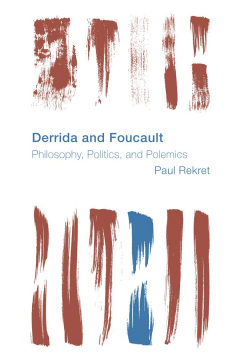
Additional Information
Book Details
Abstract
Derrida and Foucault offers a major contribution to the interpretation of these two highly influential thinkers. By tracing the moments where Derrida and Foucault’s arguments converge but also where they deviate, this book fundamentally recasts our understanding not only of these two philosophers, but of the political more broadly. Organised thematically around questions of epistemology, ethics, and politics, this is the only work to bring Derrida and Foucault’s whole oeuvres into dialogue with one another. This book frames a dialogue not only between their works of the 1960s and 1970s but also their works that deal with political questions around liberalism, capitalism and democracy. This book offers the first substantial critical assessment of Derrida and Foucault’s political work and also situates these crucial thinkers in contemporary debates in political theory.
This outstanding contribution to the literature on Derrida and Foucault demonstrates both convergence and irreducible difference between them. It outlines their common points of departure in Nietzsche and Heidegger, but also the parallel aporia in philosophy, ethics and politics to which their ‘grander narratives’ lead. Rekret sheds new light on both the tensions and the possibilities of continental political philosophy.
Paul Patton, Hongyi Chair Professor of Philosophy, Wuhan University
Recent political theory celebrates situatedness and contingency, but often fails to appreciate fully the contingency of its own affirmative positions. Paul Rekret carefully exposes this problem and its implications by returning to the two philosophers who have most inspired contemporary political thought, Michel Foucault and Jacques Derrida. Beginning with their shared background in Nietzsche’s genealogy and Heidegger’s fundamental ontology, Rekret traces the Foucault–Derrida relationship from their critical exchanges over the Cartesian cogito through their various positions on epistemology, ethics, and politics. He shows not only how their positions remain incommensurable even while they follow parallel tracks, but that through their exchange the limits of each become apparent. In this way, Rekret explains the basis for the impasse faced by political theory today.
Nathan Widder, Professor of Political Theory at Royal Holloway, University of London
In this excellent book, Paul Rekret shows how Derrida’s and Foucault’s writings are caught in the paradox of, at once, affirming and denying the contingency of their post-foundational ontologies. This is an important contribution to the debates about the politics of post-structuralism.
Lasse Thomassen, Senior Lecturer, School of Politics and International Relations, Queen Mary University of London
Paul Rekret is Associate Professor of Politics at Richmond University, the American International University London. He is author of Down With Childhood: Pop Music and the Crisis of Innocence (Repeater 2017) and has published widely on issues in contemporary political theory and in music politics. He is host of Beholder Halfway, a series of radio essays on music politics airing monthly on Resonance.Extra.
Table of Contents
| Section Title | Page | Action | Price |
|---|---|---|---|
| Derrida and Foucault | Cover | ||
| Contents | v | ||
| Preface | vii | ||
| Acknowledgments | ix | ||
| Introduction: Locating the Limits of Political Thought | 1 | ||
| Philosophy: The Limits of Critique | 4 | ||
| Politics: The Limits of Contingency | 6 | ||
| Polemics: At the Limits of Derrida and Foucault | 8 | ||
| Outline of Chapters | 11 | ||
| 1 Genealogy, Ontology, and Situated Thought | 17 | ||
| Nietzsche, Genealogy, and Metaphysics | 18 | ||
| Heidegger and Situated Thought | 24 | ||
| From Nietzsche and Heidegger to Derrida and Foucault | 31 | ||
| 2 Cartesian Exclusions | 45 | ||
| Reading the Cogito Debate: Text and History | 46 | ||
| Doubling the Empirico-Transcendental Double | 59 | ||
| Between Derrida and Foucault | 66 | ||
| 3 The Aporia and the Problem | 73 | ||
| Thinking the Outside | 76 | ||
| The Question of the Question | 80 | ||
| Neither a Problem Nor an Aporia | 89 | ||
| 4 Economies of Violence | 101 | ||
| Derrida’s Ethics of Alterity | 102 | ||
| Foucault, the Same, and the Other | 108 | ||
| The Same, the Other, and the Between | 117 | ||
| 5 The Postponement of Politics | 125 | ||
| Destabilizing Sovereignty | 126 | ||
| Radical Democracy | 134 | ||
| The Claim to Universality | 139 | ||
| Revolt and Revolution | 145 | ||
| Conclusion | 157 | ||
| Bibliography | 161 | ||
| Index | 175 | ||
| About the Author | 179 |
